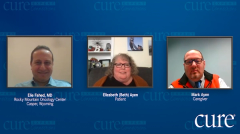
Multiple Myeloma Diagnosis to Relapse: Beth’s Mindset
Beth provides insight into her mindset at initial multiple myeloma diagnosis, after autologous stem cell transplant, while in remission, and at first relapse.
Episodes in this series

Elie Fahed, MD: What was your mindset at that time? You met with the oncologist. What prognosis did they give you? How long are you going to live? You are 29. You have two young kids. What do you remember about what you were told?
Elizabeth Ayen: At the very beginning, we were told to expect two to three more years. After the bone marrow transplant, my bone marrow team talked and said that I could live up to another 10 years after the bone marrow transplant, but they also reminded me that all myeloma patients are different, so you just do not know how or what their reaction is going to be, but that was their hope—10 years after.
Elie Fahed, MD: The most optimistic timeline you were given was 10 years.
Elizabeth Ayen: Right.
Elie Fahed, MD: The more realistic one at that time was 2 to 3 years.
Elizabeth Ayen: Yes.
Elie Fahed, MD: That was 21 years ago, correct?
Elizabeth Ayen: 23.
Elie Fahed, MD: 23 years ago. You never planned for your 50th birthday.
Elizabeth Ayen: No. I never planned to see my kids graduate from high school or college or see them get married. Now they are having kids of their own, so I have gotten to see all those things in these 23 years that we were not expecting.
Elie Fahed, MD: Isn’t it wonderful? All this is because of the progress of science.
Elizabeth Ayen: It is.
Elie Fahed, MD: There was nothing way off after your transplant. You went into a long remission. It took about 12 years before you started having symptoms again. Tell us about how this felt.
Elizabeth Ayen: It was great. I was working as a tutor in an elementary school. A friend of mine said, “Let’s go back and get our master’s degrees so that you can get certified and have your own classroom.” I did that during those 12 to 14 years. During the 12th year, I started having pain in my right rib. I kept seeing doctors. I had an oncologist in Cheyenne when we lived there, and he just kept saying, “I can’t really see anything on the scans.” At that time, they had started using the serum light chain test, and he was like, “Your light chains are going up a little, but I am not really concerned about it.” I stopped complaining about the pain because he kept telling me, “It was nothing.” We ended up moving to Casper when I was doing my student teaching, and I went to my first 6-month appointment there. There was a doctor who was interning there until Dr. Fahed got all his certifications for Wyoming. He said, “I don’t like these numbers. I think you should have an MRI done.”
This transcript was edited for clarity.
